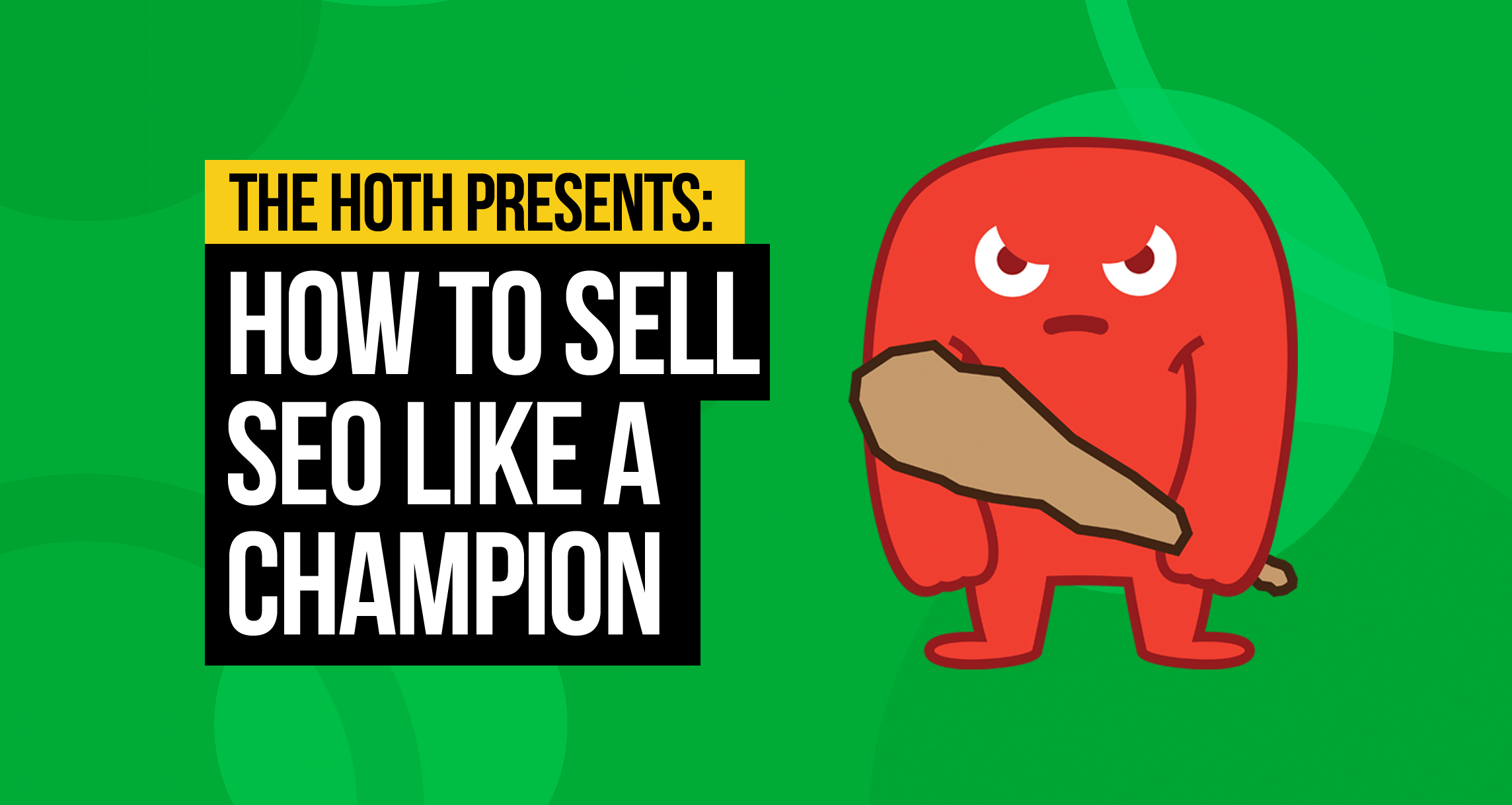
How To Resell SEO Like A Champion
The Ultimate Guide To Selling SEO Services
- Want to drastically increase your agency’s revenue through selling SEO?
You’re in luck, because in this guide we’re going to walk you through the best ways to do just that.
This complete SEO agency toolkit is based on our 10+ years of experience working with thousands of agencies all over the world.
When you’re done, you can confidently sell SEO to your clients.
You’ll learn everything you need to know about:
- How to get your SEO services up and running
- How to attract clients
- What to say on the phone when selling
- How to price SEO services
- How to close deals
- How to retain the clients you close!
We’ll also talk about the minimum SEO knowledge you need in order to sell it.
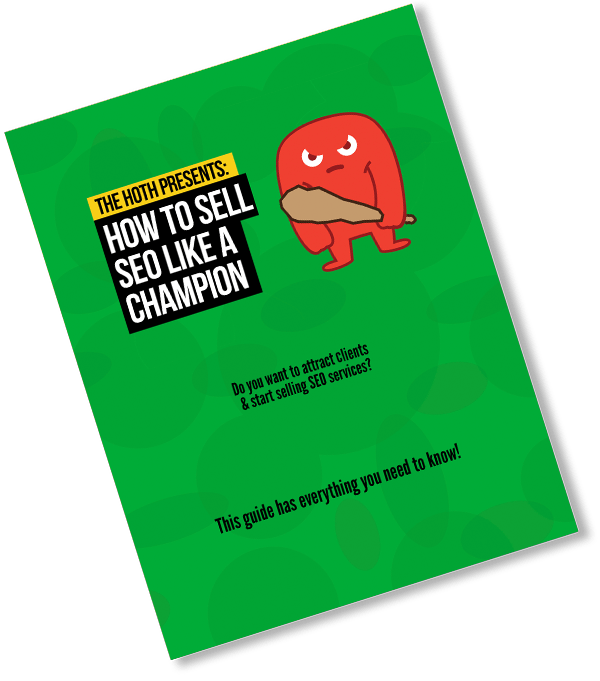
-
Don’t have time to read the entire guide right now?
Let us send you the downloadable version so you can read it when it’s more convenient for you.
The good news is you don’t need to be an SEO mastermind. You also don’t need to add any new people to your team to get started.
And, if you do it right, it’s quite reasonable to say that you can double your business’s revenue!
Sound good? Then let’s get your SEO services rolling!
P.S. Do you want access to a community of agencies who are getting daily tips, techniques, and 1-1 help? Join our exclusive Facebook Group:
SEO Selling Secrets for Agencies
Why Selling SEO Doesn’t Have to Be Hard
Let’s start by talking about why selling SEO is easier than you think.
Misconception 1: “I need to learn everything about SEO”
You don’t need to learn everything about SEO to be able to sell it.
Truth is, you can start offering SEO services simply by understanding some of its core principles.
You should know enough about SEO to understand yourself how it works so that you can accurately explain it to clients. But you don’t need to be an expert of every facet of SEO to do this.
Your job isn’t to become an SEO expert. Your job is to translate SEO into a results-focused description that so your client can understand how it helps them.
To be honest, going on about the ins and outs of in-depth SEO may even make the client lose interest. Painting a picture of how results through SEO will help their business will close the deal faster than walking them through a complex topic.
Misconception 2: “I have to do all the work in-house.”
It’s understandable to think you may not have the time or ability to do a ton of actual SEO work.
But the beautiful thing about offering SEO services is that you don’t have to do them yourself!
You can consistently deliver quality SEO work to your clients by enlisting the help of a white label SEO service, like The HOTH.
If the term “white label” or “reseller SEO” isn’t familiar, it means that the SEO work is done by another company but sold under your name.
At The HOTH, we even have a bulk buyer program just for SEO resellers! Check out our bulk buyer program here to get an idea of what bonuses resellers can expect.
The great thing about this is, not only do you not have to do the SEO work yourself or in-house, but white labeling your SEO also means you get to focus on providing great service to your clients, since you’ve entrusted the work to SEO professionals.
Our services are designed for scalability. We work with thousands of agencies around the world (and have thousands of reviews to prove it!).
Using a scalable solution means you can sell SEO services to as many clients as you want without having to hire and train new employees.
Time is your most precious commodity. Focus on your clients and the other needs of your business and let us handle your SEO work.
Want some help getting started? Just book a meeting with us and we’ll get you all set up!
Ok, now that we have the most common misconceptions out of the way, let’s get into what SEO knowledge you need in order to start selling.
SEO 101: What You Need to Know
Many small business think that putting up a website means they’ll start getting more sales.
But that’s not how it works. So they wonder how to get more people to their site.
Then they’ll do some digging and learn they need to optimize their website for search to get more visitors.
That’s where you come in as an SEO seller. Your clients want:
- More leads
- More calls
- More form fills
- More sales
By getting their website in front of potential customers in the search engines, you drive more people to them. This gives them more of the above– what they want.
And yes, SEO is a technical practice. But it’s also something that anyone can understand. In simple terms, SEO gets more traffic to websites by showing them more prominently in search results.
The SEO process
Let’s define the basics of the SEO process. There are several major components:
- Initial Audit
- Keyword Research
- OnPage Optimization
- Link Building
I’m going to summarize each step of the process. These are the most important things for you to understand so that you’re able to accurately explain SEO and why it works to your clients.
Quick site analysis and Google penalty check
Many clients will have just a little bit of SEO optimization done on their site. Others may have paid for work that resulted in the opposite: over-optimization.
That’s why it’s so important to start by auditing each client’s site to check for any penalties their site may have experienced.
Some things that cause penalties:
- Low-quality links that point directly to the site
- Duplicate content
- Over-optimization for a target keyword
If you do decide to work with a client whose site has been penalized, know that it takes a ton of work to dig it out of that hole, and that you should be upfront about this– and charge them accordingly.
You can use our FREE basic SEO Audit Tool here to get a quick overview.
Keyword research
After you’ve taken a look at the site to determine there aren’t big underlying issues, it’s time to do your keyword research to find the right keywords to target.
You can do this in a few different ways.
Easy win keyword research
One of the smartest ways to do keyword research is to look at which keywords the site’s already ranking for in positions 4-30 (AKA the first 3 pages of the SERPs).
If a site’s ranking for a keyword in one of these spots, it shows that Google already sees the site as a relevant source for that keyword search– it’s just not in the top 3 positions where the most traffic is.
We have a free Search Engine Ranking Checker tool on our site you can use to see what keywords a site is ranking for here.
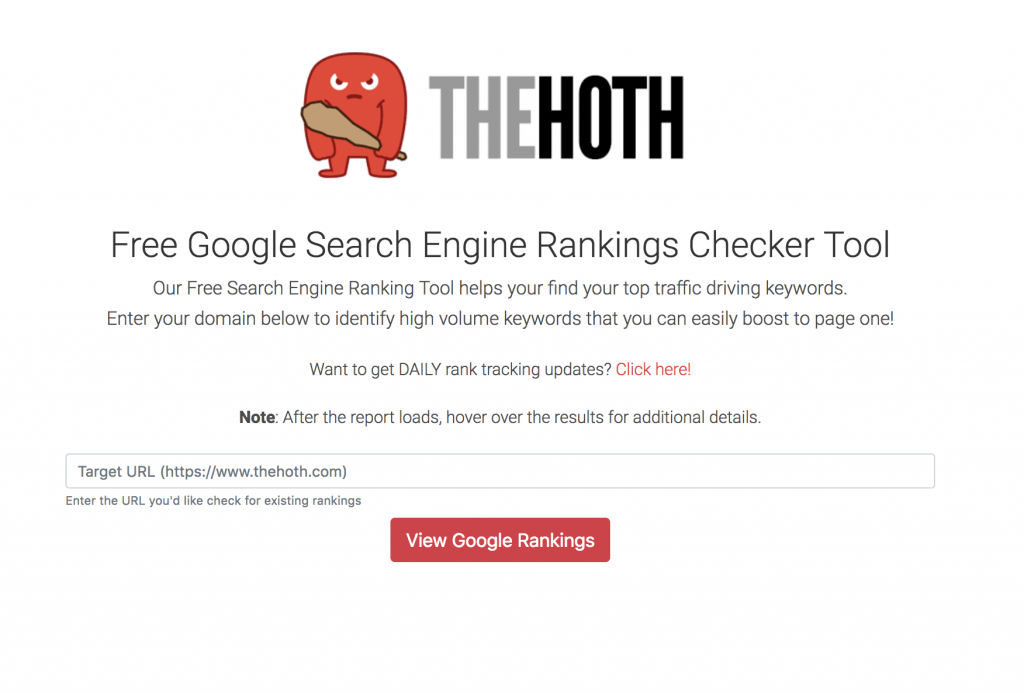
The higher you push the rankings for these keywords up (ideally to the top of page 1), the more traffic the website will get.
Content gap analysis keyword research
Next is a Content Gap Analysis, where we’ll look for keywords that a client’s competitors are ranking for that they aren’t targeting yet.
These are great keywords to use to get new ideas for content or to re-optimize existing content.
We have a free content gap analysis tool that can help you get started.
OnPage optimization
OnPage optimization essentially tells Google what your site is about, which is necessary for rankings.
Each page of a website needs to be optimized with keywords and relevant content to tell search engines and readers what the page is about.
This includes (but isn’t limited to):
- Optimizing title tags with keywords
- Optimizing urls with keywords
- Optimizing meta descriptions with keywords
- Optimizing H1’s with keywords
- Optimizing images with keywords
- Adding contextual content to your site
- Adding relevant internal links to each page
Our HOTH Learning Hub has a huge section dedicated to OnPage SEO. You can check it out here.
Link building
Links (Backlinks) pointing to a site are one of the most powerful Google ranking signals.
Links that point to your client’s website are like “votes” for it. More links help give the website greater weight to rank in the search engines. Try out our Backlink Checker Tool to see the top backlinks pointing to a specific domain.
But not all votes are equal. A link from a site with a great domain authority (like Forbes or USA Today) carries more weight than a smaller blog.
There are lots of ways to get links. These include:
Google has released many updates over the years so it’s important to understand how SEO is constantly changing.
These are the basics that you’ll need to know to explain the SEO process.
Check out our SEO strategy guide for an in-depth explanation of how to get the best results in the shortest period of time!
Who Are The Best SEO Clients? (And How To Sell To Them!)
There are lots of types of SEO clients so we’ll break what you’ll need to know based on a few common customer avatars.
Make more money with fewer SEO clients
There are lots of agencies offering to sell SEO for $100 a month or less. This usually includes some basic title tag adjustments on their website.
This is fine because it’s better than doing nothing, but it probably won’t move the needle for a business in a competitive industry.
If you sell SEO for a rate this low, you are going to need to manage a lot of clients if you want to increase your revenue, which isn’t easy to scale.
Working with clients that have larger budgets will significantly impact your revenue. You’ll also be able to deliver more meaningful results.
Increase your conversions by niching down
You could offer SEO services to everyone, but we’re huge fans of niching down and selling to a specific industry.
Why niche down? Put yourself in the client’s shoes for a moment– they have a lot of choices when it comes to who does their SEO for them.
By promoting yourself as a specialist for their specific niche, you gain more credibility by indicating that you’re here to serve their business specifically.
When you niche yourself down to cater to industries like real estate, heavy equipment rental, or all-inclusive getaway, you can charge more and deliver more value. You’ll start to understand the industry, know typical client issues, keywords, and get a competitive advantage over generalist-SEO companies.
If you haven’t selected a niche, a good place to start is with your best and most profitable clients. Where could you find more of them? What conferences could you sponsor? Could you target them on Facebook?
By niching down, you can drastically increase you sales conversions.
Typical SEO client categories
Let’s take a moment to talk about some of the most common clients you might get. SEO is a bit different for each customer, but there are a few general customer avatars you can plan to get:
Local SEO clients
The goal for Local SEO is to get your clients to appear when someone searches for their services in a geographically localized search. These are usually brick and mortar businesses or service area businesses.
This might look like general contractor [“city name”] or plumber “near me.”
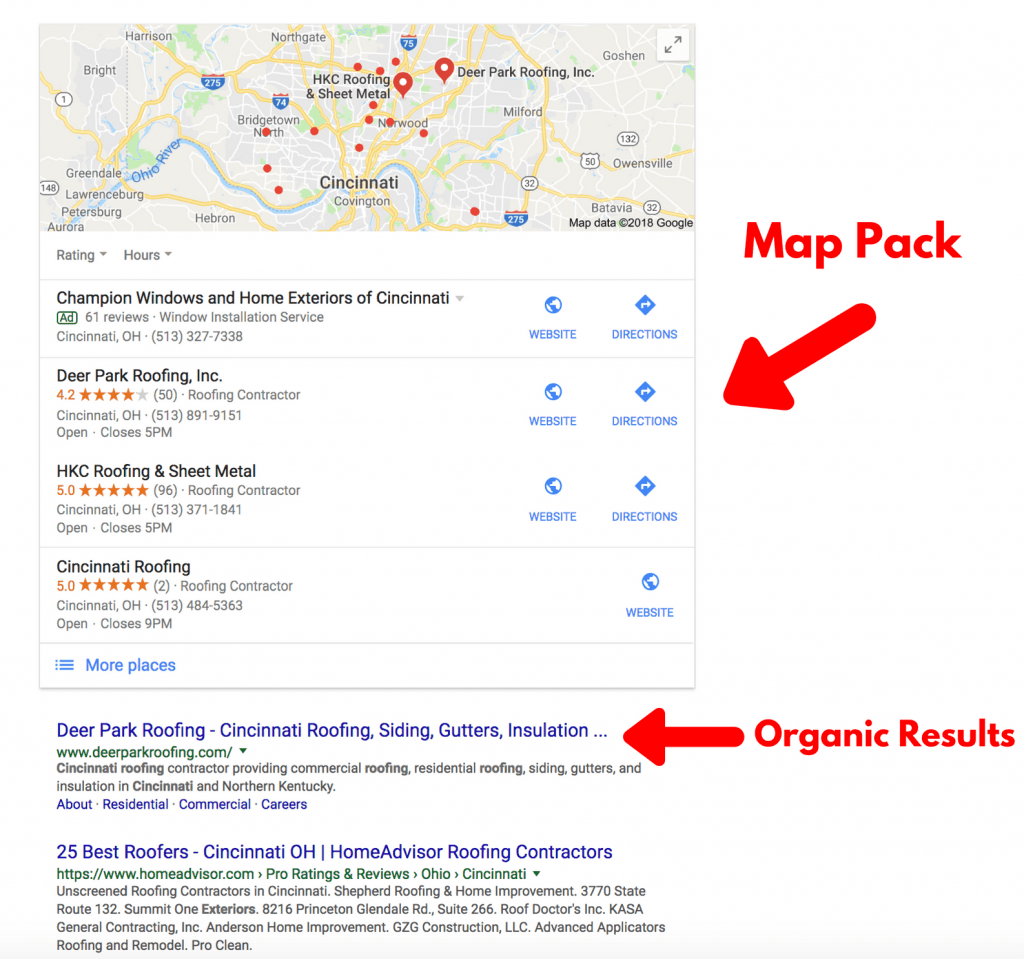
A few things you’ll want to consider when selling to Local SEO clients:
- Ranking in the “Local Pack” and Maps: When Google sees someone’s search intent as looking for a local business, it’ll often bring up local listings in the form of the business name, address and location on a map.
- Google Business Profile: This is a Google business listing: something many clients neglect to set up. It’s an easy service to provide them, and it makes it far more likely to get their business to appear in the Map Pack.
- Ranking Website Pages: These are the natural top results in Google that will appear for any search term in order of authority.
- Local Listings and NAP Citations: Signals provided by listing a client’s business in directories like Yelp and Yellow Pages provide additional local cues to Google.
- Local Reviews: Online local business reviews impact local SEO. What matters is the quantity of reviews, the rate at which they’re left, and the diversity of where they appear on Yelp, Google, Facebook, and other platforms such as Tripadvisor.
Check out our in-depth local SEO guide here.
E-Commerce SEO clients
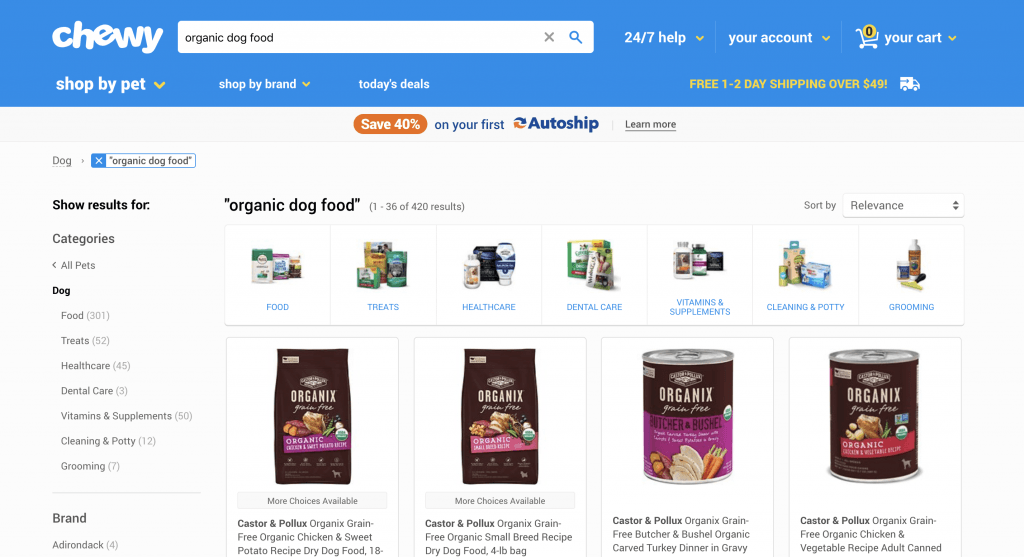
E-Commerce / Online stores are great targets for SEO clients as ranking their pages can often provide huge ROI.
There are a few things you’ll want to consider when selling to E-Commerce clients.
- OnPage Optimization and Content Creation: Many e-commerce sites lack content on their product pages, so creating unique product descriptions (not duplicate manufacturer descriptions) is a common technique for E-Commerce.
- Blog Content: Adding content to an eCommerce store’s blog can help the site to rank for a lot more keywords and get more links. People prefer to link to articles more often than products.
- Link Building: Getting links from manufacturers, review blogs, guest posts linking back to the blog, and setting up good internal links are all good strategies for e-commerce.
Check out our in-depth E-Commerce SEO guide here.
Online businesses
For most other types of clients, the content and link building strategy we’ve been talking about is a reliable method to get them results.
Some other common types of clients are:
- Publishers: Sites that focus on creating content and making money through traffic-generated ad revenue (like Gamestop) or affiliate revenue (like Nerdwallet).
- Online Service Businesses: Sites that sell their services online (like The HOTH or Adroll)
- SaaS: “Software as a Service” sites that earn money by increasing the subscriber base to their software (like Ahrefs, SalesForce, or Buffer).
It’s important to understand the differences in each client type category as well as the individual business. All clients are unique, but understanding the facets of each client type and applying a solid SEO strategy to each leads to great results.
There are lots of different products that you can sell to these clients and you can check out our complete list of re-sellable SEO services here.
How Much To Charge For Your SEO Services
The question you’ve been waiting for: How much should you charge?
There are a few points to consider here, so let’s walk through each:
Start with your goals
What would you like your monthly income to be from selling search optimization? Since you’re white labeling, what profit margin would get you there?
To calculate your monthly income multiply: # Clients x Price x Profit Margin = Net Revenue
There is no “standard rate” for SEO services: The results you deliver to the client should exceed what they pay you.
Knowing this, you can determine your profit goals.
The HOTH’s SEO services are specifically designed to be sold for white label purposes. Most agencies charge clients anywhere from 2X to 4X your costs by white labeling with us, and that price can be justified by the management of the client and additional services provided.
If you want to really scale SEO services, eventually you’ll need some help managing all your clients with the help of a sales staff. You’ll want to factor in a percentage as commission structure to your calculations in that case.
Next, you need to establish the best pricing model for your new services.
Pricing models for SEO
We’re huge fans of productized services and packaged-based SEO.
We feel strongly that for the vast majority of resellers, a package-based pricing structure is the best pricing model for closing deals. It’s what we sell and what our white label clients sell.
SEO can be a confusing, multi-faceted practice and by simplifying the services into a clearly defined package structure & deliverables helps close deals. It’s easier to explain and easier for clients to understand and make a decision.
At The HOTH we offer individual services for OnPage optimization, Link Building and Content Creation, among other products. Someone who really knows what they’re doing might pick and choose from these services to create their own SEO strategy, but we always prefer selling a combination.
Package-based pricing also gives you the flexibility to sell a single package, multiple packages, or recurring packages on a retainer or contract.
To us, it’s natural to offer a combination of services as packages under a managed SEO product because it delivers results for our clients.
Recurring revenue and retainers
While we do sell a-la-carte services, it’s a huge advantage when you can get clients on recurring billing / retainers.
It takes time to see SEO results, so setting those expectations up front help to give you enough time to deliver results. And even when clients start seeing those results (generally around the 90-day mark), SEO isn’t something you just stop doing. You have to have a consistent, long-term SEO strategy if you want to hold onto any rankings you’re able to get from a campaign.
A common thought that we see with clients that tend to have less success is “I’ll try out a couple links and if it works I’ll do more.”
In our experience, this one-off type of SEO strategy tends be less successful. Google wants to see consistency in the site becoming an authority. You can see our recent case studies here for evidence.
Using contracts for SEO services
Contracts are great because they’re a revenue guarantee, and you’ll be able to retain those clients long enough for them to see the positive impact SEO has on their business.
Here at The HOTH, we have a Terms Of Service that everyone agrees to when purchasing our products, and we also have (but don’t require) contracts.
If you get to the point where you want to do promotions when you’re selling or reselling SEO, attaching them to a contract is a great why to continue to build on the initial investment.
That said, we do recommend consulting with a legal team if you’re interested in setting up a contract system for when you sell SEO.
How to give a ballpark figure with link profile analysis
A lot of clients come to us and ask “How much money would it take to rank #1 for this keyword?”
This is a really tough spot to be in because SEO doesn’t really work this way any more. There are lots of factors to consider:
- Page type: What type of page is Google ranking for that keyword? Are they blog articles, ultimate guides, product pages, tools? Would this page type even rank?
- Content Length: Studies show that longer content tends to rank better. Does the page have enough content?
- Domain Authority: What is the overall domain authority for the sites that are ranking in the top positions?
- Other keywords: Often a page will not just rank for 1 keyword, it can rank for hundreds or thousands. Are these keywords integrated into the page?
- Current Links vs Competitor Links: How many links are you starting with? How many do the top ranking pages have?
With that said, it can still be helpful to do an analysis to see in general what it would take to rank on page one for a keywords.
With that said, it can still be helpful to do an analysis to see in general what it would take to rank on page one for a keywords.
Since backlinks to the specific page is one of the most important factors in ranking, we like to take a look at the average number of backlinks the sites on page 1 of Google have for that specific keyword.
Then you can multiply the average number of backlinks by average link cost to get an estimate. Then you can add in your margin, and divide by number of months necessary to achieve that result.
For instance, lets say the average number of backlinks it will take to rank on page one is 50.
Link Costs:
50 links x $100 per link = $5,000 Total Campaign CostAgency Margin:
$5,000 x 2 = $10,000 (Client Cost)Months To Achieve Result:
$10,000 / 6 Months = $1,600 per monthThis way, you can show a client a more realistic idea of what it will take to rank for that keyword, cost-wise.
Obviously you most likely will not be building links only to this page. You may want to invest in OnPage Optimization, adding additional content to the page, adding supporting content to the blog. You may also want to get some higher authority links that cost more, so make sure to factor that in as well.
To be clear, we do not recommend promising any specific result like exact keyword rankings, number of calls, form fills etc. There are too many factors involved.
However, when clients come and ask specific questions, this is a methodology for giving you an idea of what to tell them to see if their budget is in the ballpark. This also can help instill confidence in the client in a realistic fashion if they even want to compete in that market.
By showing them the raw data of their competitors and where they currently stand, you can justify the prices you will be charging.
Now we have covered our recommendations for how to price and package your SEO services if you decide to resell SEO.
If you would like some help on how to integrate SEO services into your business, book a free meeting with one of our account managers here. We help agencies and resellers get started every day!
Now let’s get into how to create some simple funnels that will make selling 1000X easier!
How To Get & Convert Clients: Simple SEO Funnels That Work
We’re trying to minimize the amount of time you spend selling, so you can make more money.
Cold selling is one commonly used sales tactic and it’s a lot of work.
Hard selling with cold outreach requires you to play the numbers game. It’s about getting your outbound sales messages to as many people as possible in the hopes that a few become clients.
This can work, and some people preach it. That’s great for them, but it isn’t our preference.
In our view, the world is bombarded with sales messages, and people don’t like it.
Wouldn’t it be cool if you could just attract your perfect customer to you?
Inbound marketing and the automated customer SEO funnel
The long-term strategy we recommend to generate leads is inbound marketing.
Inbound marketing is the practice of creating content and attracting leads to you vs. running outbound campaigns.
The Automated Customer Funnel takes them from their initial contact with your brand, through developing a relationship, to booking a call with you.
It looks like:
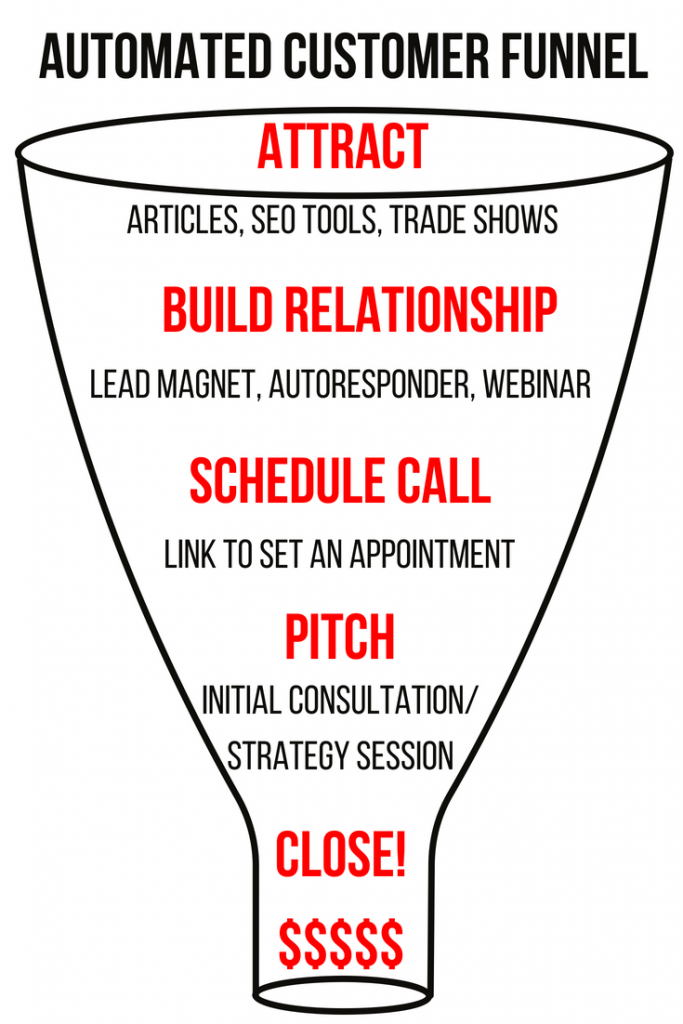
Let’s break down each phase:
Attracting SEO leads
Customers in any industry tend to do their own research, including when they’re shopping for SEO.
If you capture their attention and help them to solve a problem, it’s a lot easier to position yourself as an authority. And then they’re more likey to pay you to help them.
By identifying their problems and promoting content that solves it, you’re able to attract and develop a relationship with them on autopilot.
Here are a few ways to automatically attract leads:
- Ranking Content: Publish regular blog posts on your site to capture search traffic that is already aware of and considering SEO for their business. Answer common customer questions through blog posts that help educate them as to the possibilities of SEO and gain their trust. This is a great entry point into their relationship with you.
- Opt-in Popups and Subscribe boxes: You can use a plugin to set up a popup on the blog posts they land on to capture their email address and continue to build further trust. It often helps to incentivize them to enter it in exchange for a “lead magnet” such as a PDF guide or to see an informative webinar.
- Offer a Free SEO Audit Tool: A free tool like our SEO Audit Tool gives their website a “score” and confirms to them that yes, there are things on their website to improve for SEO.
Remember the entire point here is to attract the leads in and capture their contact information. This way they are giving you permission to market to them.
Check out our article on 10 more ways you can generate SEO leads here.
Developing the client relationship
Sales cycles can vary with SEO, but because it’s such a popular channel and there is a lot of competition, you’re going to need time to develop a relationship with the prospect, show them you are trustworthy, and convince them you are the agency for them.
We recommend using email marketing to send them relevant content. It’s one of the best ways to develop a relationship.
You can send an automated sequence of content to your prospect with an autoresponder. You can use an email software to set it up. Now every new customer who enters their email can automatically receive a sequence.
What should you send these prospects?
We like to send a mix:
- Helpful articles that answer their questions and demonstrate expertise: For example, these results-driven articles of ours perform well because they focus on how we get impressive results through SEO, or how they could do it if they tried: How We Get 434,886 Pageviews Per Month and The Ultimate SEO Strategy Template For Getting More Website Traffic
- Webinars: These are a great way to market the value of SEO. You could do them live (and we do), but you can also pre-record them.
- Special Offers: We send promotions with a limited time deal that help get people off the fence. Don’t overdo this, but weaving in promotions works amazingly well.
People buy SEO from companies that they know, like, and trust. That is what your content accomplishes.
If you’d like to know more about getting started with Webinars, be sure to check out our two easy guides for that:
Next, after our prospect is warmed up, let’s close the deal.
How to close an SEO deal
We have a good amount of clients that will purchase without ever talking to us because ordering is really easy. (We’re big fans of just putting an order button on your website and allowing prospects to purchase when they want.)
With that said, pushing prospects to a phone consultation is one of the best ways to further the relationship, gain that trust, and close the sale.

-
Don’t have time to read the entire guide right now?
Let us send you the downloadable version so you can read it when it’s more convenient for you.
We like to prompt prospects to schedule an appointment directly in a lot of our marketing through a number of ways:
CTAs (calls to action) in our emails:
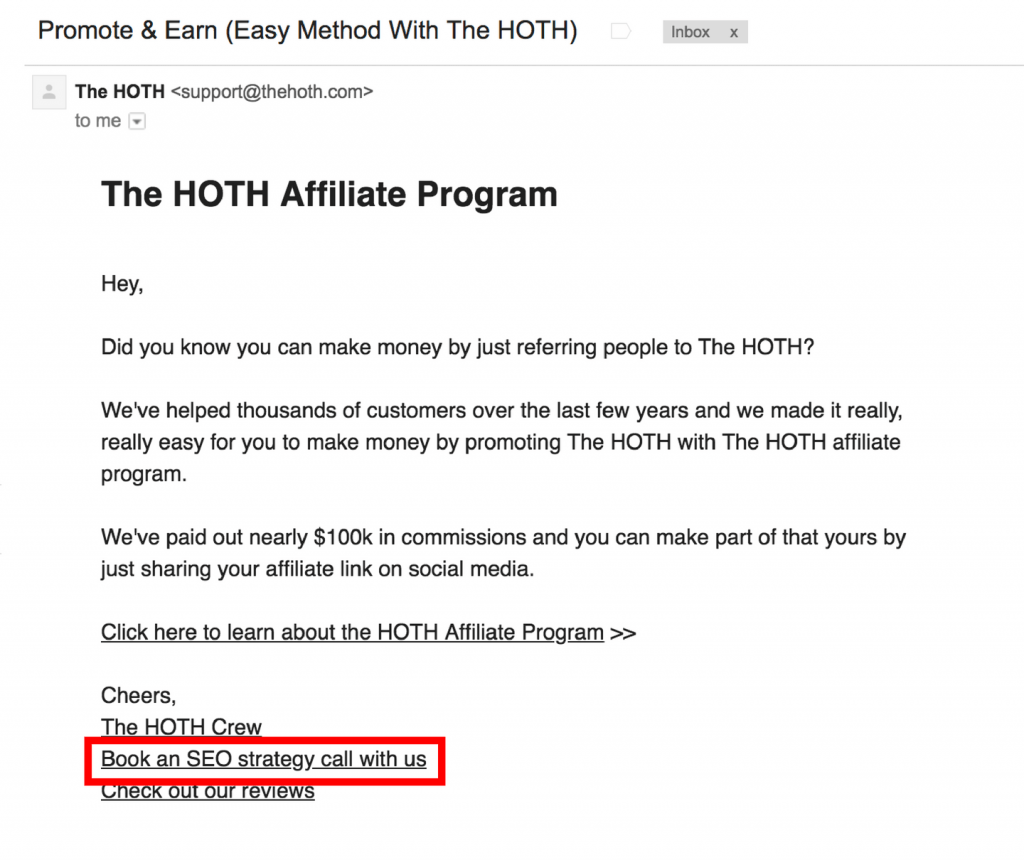
CTAs on our website:
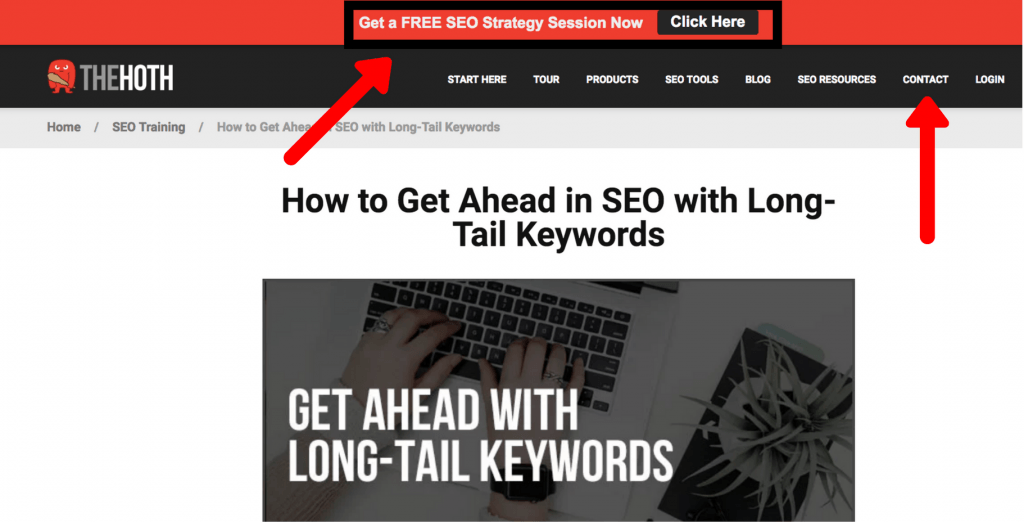
You can use a really cool software like Calendly that allows prospects to book a meeting with you.
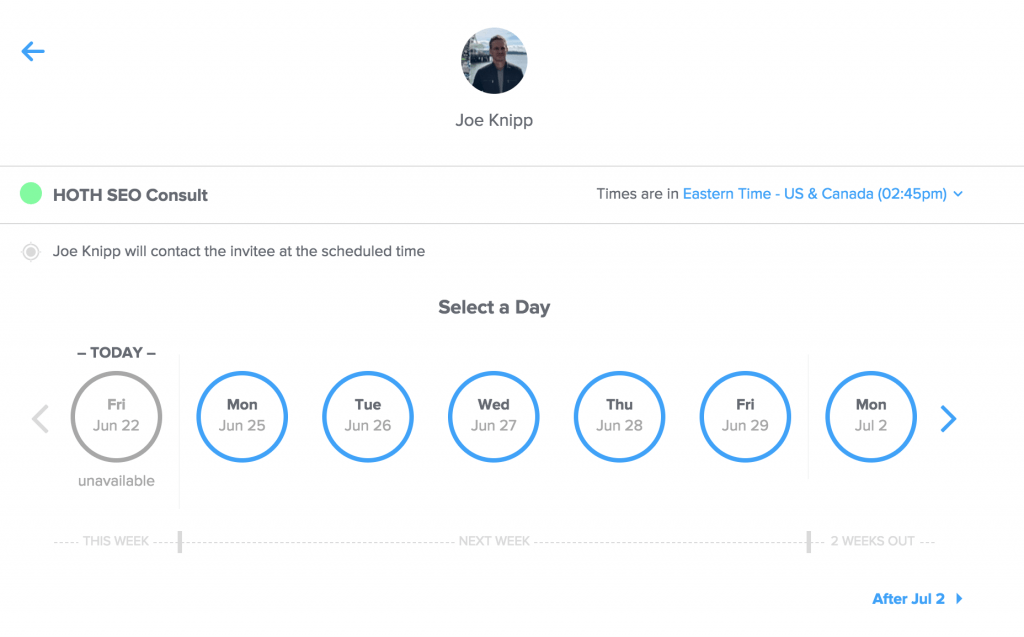
These inbound marketing tactics allow you to sell way more easily because you don’t have to convince them of the value of SEO on the call. Your content has already done that by educating them.
Once they schedule a call with you, all you have to do is learn about their situation, pitch and close them.
For a more in depth look at how to scale this process, check out this article on how to double your business we wrote when things really started taking off for us.
Now that we’ve shown you how to get appointments, let’s walk through the SEO sales call itself.
P.S. Do you want access to a community of agencies who are getting daily tips, techniques, and 1-1 help? Join our exclusive Facebook Group:
SEO Selling Secrets for Agencies
Selling SEO On The Phone: What To Say and How To Set Expectations
First, it’s important to be able to streamline the conversation by guiding the call.
A common mistake is to just start talking and selling, but this can overwhelm the client (and honestly, kind of turn them off).
Instead, we like to think of these calls as consultations instead of sales calls. Your job is to help connect a customer that has a problem to the solution.
Plus, because we’ve already warmed up the client with all that great inbound marketing, so the close should be really easy.
Here are the proper steps to the sales call
Ask the right questions
You should be asking questions so that you can understand the client’s market and gain insight on what is important to them in the sale.
Here’s some examples of questions you can ask:
“Could you give me an overview of your business?”
This question helps you understand some basics of their particular business and its challenges. Get to know their business model, how much a client is worth, etc.
Look for terminology they use, services or products they want to promote to get some ideas for keywords or pages to target.
“What is your past history with SEO?”
They’ll give you an indication of their knowledge level and what SEO work they may have bought or done in the past, if any. This will help guide how technical you can be in the conversation.
You can probe a little to see whether they’ve had any sketchy work done for their website, so you can speak to how you are different. For instance, even simply explaining how out-dated techniques are not effective and clearly showing the current ranking factors can go a long way.
“What is a typical sale like for you?”
The idea with this is to put something in your back pocket to clearly explain the return on their investment to them.
For instance: If a roofer’s typical roof job is worth $10,000, and if they are spending $2,000 per month on SEO, they could get on a contract for 5 months, and if they even get 1-2 clients, they could break even or get positive ROI very easily.
Focus the conversation on how much ROI the SEO work you do will generate over time. This can really open their eyes to the power of SEO for their business, and will help you sell SEO.
“What keywords are you looking at targeting?”
People will often decide on some keywords they want to go after before speaking with you. It’s good to check on this early to see where their head is at in terms of keywords even though you’ll be doing some research for them.
“What are struggling with? What do you want to achieve?”
You want to minimize your time on the call while still being effective. That being said, it can pay to give them a moment to answer a more open-ended question like this.
They’ll feel more understood by you if you give them a chance to explain their answer to this question.
More importantly, they’ll give you additional signals as to their business’s challenges, some of which can’t be solved through SEO (such as a poor product or bad service on their end).
Asking what they want to achieve lets you know their expectations for your service, and whether those expectations could be fulfilled (or readjusted) by you.
Step 2: Do a quick SEO analysis
During the SEO consultation you can do a live SEO analysis to get a handle on where they are at currently, as well as in comparison to competitors.
Being able to quickly rattle off stats, keywords, and opportunities really positions you as an authority while on the call.
We recommend a tool like Ahrefs to do the analysis.
Here’s a video that demos this process and what to say during it:
In the video demo, Greg goes over:
- Current ranking keywords and easy wins
- Current backlinks
- Competitor backlinks
- Strategy recommendations
Comparing your client’s metrics to their competitors is a powerful psychological tactic.
Something competitive in human nature is unlocked when you can say “This competitor is getting this much traffic and backlinks.”
Use analogies to explain SEO
If they’ve shown they have a lot of SEO knowledge, you can be straightforward in your use of the terminology. However for the majority of clients, you should explain SEO in a way that’s easy to understand.
The easiest way to explain SEO to your client is through simple analogies.
A lot of what you do for SEO concerns gaining backlinks to your client’s site. When they ask about the importance of backlinks, explain the concept to them as being like a vote or a reference.
If 40 people refer you to a pizzeria, you’ll trust that place a lot more than if only one or two people refer you there. Google is the same: if 40 people link to you versus 1 person, Google trusts you a lot more.
Then you can explain backlink quality.
Sites with more authority are like a 5-star chef referring you to a restaurant versus just anybody on the street.
Getting them a higher quality backlink from a site like USA Today can have more of an impact on their site than a bunch of low-quality links.
Emphasize that the “votes” gained through backlinks and other work are long-lasting.
SEO is like a rocket ship: you have to put in a lot to get it off the ground. Once you get it going and their site is an authority, it’s much easier to keep going.
Setting expectations
It’s very important to set expectations when selling SEO.
Results: It can be easy to go down the rabbit hole. SEO can help bring traffic to the site, but it’s just a piece of the marketing puzzle. The visitors still have to fill out a form, call, or give an email address. Then your client needs to actually answer the phone, respond to the email, close the deal, etc. It’s a good idea to focus on simply the “increasing organic traffic” portion of the equation vs promising a number of calls or sales (because it’s tough for you to control that).
Timelines: In our experience, it usually takes about 3 months of consistent building to start seeing significant results. Sometimes it can be less, or sometimes it can take strategy changes after month 3. It’s very important to stress that SEO is a long term process (and should be!). You don’t want to do anything aggressive that would damage the site. You want a nice progressive build out.
Communication: Let the customer know how you are available and put communication as a priority. The majority of lost clients happen because of poor communication. Make sure your SEO clients are in the loop at all times.
How to Close an SEO Sale (and Handle Objections)
Ask for the sale
Once you’ve explained the required work and the prospect has had a chance to ask you their questions, it’s time to close the sale.
Ask for the sale while you have them on the phone. If not you’ll most likely have to wait a couple weeks. This lost time can mean you lose the sale.
When it seems like their questions are done, say, “So are you ready to get started?”
If they hesitate or say they’ll order it later on your website, you can add in urgency by offering a special discount or bonus.
Say “I can waive our regular set up fee that you’d get charged, but I have to place the order with you to do that.”
Know these common objections
Pricing is common objection because there are lots of cheap services online. Thing is, man online services can stack up deliverables that don’t bring significant results.
You can rebute these statements by looking at the other offer and explaining how you’ll bring more value.
Another common objection is asking for a one-off or a trial. Here you can explain that Google really wants to see consistency in your site becoming an authority, so one-offs don’t work.
Additionally, Google wants to see a wholistic strategy including OnPage optimization, links, and content.
Use special offers
You can use special offers to resell SEO. It’s handy to always have something to give them on top of what you’ve listed.
To avoid burning our customers out with too many discounts, we rotate deals on different products every month that we promote through email, ads and a feature page on our site:

You’ll need to figure out what extent to do this on your own. This could take the form of:
- Waiving the setup fee
- A discount on one category of the work
- Discounts on bundles to encourage bigger purchases with better results
Be selective in your use of these incentives and keep an eye on margins.
IMPORTANT: Make the purchase easy
To create as little as friction as possible for the purchase, it’s a good idea to have people place their order on your site while you have them on the phone.
Many firms create contracts for each client that require a signature. There’s something about having to sign along a dotted line that makes people think twice.
It’s easier to let them know which package or SEO service works best and make the purchase easy.
However, everyone’s business and clients are different. Yours might prefer giving them something to sign, especially if you got them to agree to 3 months of work or more.
If so, adjust accordingly. You can use Docusign or a similar software to create these electronic contracts.
(Once they’ve placed their order, you have every right to jump out of your chair and do a little dance before high-fiving anyone nearby.)
SEO Reporting and Retention
There’s nothing worse for a client then seeing you drop off the face of the earth after selling them on your great service.
To keep their confidence and get future orders, it helps to ensure their satisfaction your SEO services post-purchase.
Post-purchase follow up
Don’t wait until their first month is complete to follow up – call them a week after the sale! This allows you to check in, let them know their campaigns are in-flight and answer any questions they have.
If you wait until their first month is over, they will have forgotten nearly everything you told them, and you’ll have to re-sell yourself and all the things you are doing.
Monthly SEO campaign progress calls
Calling to check in with them shows that you care if their SEO campaigns are successful..
Track the work each month to show them what you’ve done and its effect.
You can do this by:
- Using Ahrefs to chart the backlinks and position changes of their site in search
- Keeping a production log of work done.
- Use a platform like Agency Analytics to create a marketing dashboard for them.
Make sure they’re satisfied with the deliverables
In the business of selling SEO, ensuring client satisfaction after fulfillment is crucial. That’s why we made sure you knew how to set the right expectations about SEO before you sold.
That being said, unsatisfied customers are bound to happen (in any industry). Your reputation for doing good SEO work is more important than keeping money from an individual customer who wasn’t satisfied.
Offer great support every step of the way, including after fulfillment, by being available for them. If they express dissatisfaction, make sure their expectations are still realistic and try to correct them if not.
The reality is that clients will eventually cancel, and it’s not always your fault. By setting expectations, over-delivering in value, communicating thoroughly, delivering on your service, and asking for feedback, you set yourself up for success.
Get reviews
Each time you deliver a package for a client, ask them to rate your service by sending them an email with a link to do so. This gives you a chance to intercept any dissatisfied clients before they leave a public review.
The more positive reviews you can get, the more future prospects will trust you. When it comes to reviews, ask and you shall receive. Few people review without being prompted to do so.
If you need help doing this, you can check out our review getting software here.
Track results for SEO case studies
Take note of the results you get clients and keep a log. You can use past jobs and reviews from customers as proof of your ability to deliver great results.
Not only that, you can use these metrics to create content like case studies for traffic and sales brought through SEO that earns you even more trust before the call.
We have a couple detailed guides to getting reviews here and here.
Conclusion
There you have it: The nuts and bolts of selling SEO.
We hope you realize that selling SEO is not so hard after all. It just takes some prep work to increase your SEO and selling knowledge, get the leads, and close them.
Selling SEO can transform your business and expand its earning potential. The beautiful thing about it is that you don’t have to do the work. Even if you have zero experience, you can easily resell SEO.
Don’t forget that as an SEO reseller for The HOTH, you get access to special bonuses as part of our bulk buyer program.
If you’re ready to get started selling SEO, book a meeting with us now. We’d love to help!
P.S. Do you want access to a community of agencies who are getting daily tips, techniques, and 1-1 help? Join our exclusive Facebook Group:
SEO Selling Secrets for Agencies
-
Don’t have time to read the entire guide right now?
Let us send you the downloadable version so you can read it when it’s more convenient for you.



Wow this is a huge guide, thank you so much for putting it together. Bookmarked!
You’re super welcome! Hope it helps!
Awesome post !
Thanks dude
You’re welcome Fabien, glad you like it!
Thanks for this great, in-depth article. Super useful.
Great, hope it stays a useful reference for you!
Really cool post with awesome tips
Thanks guys!!
Nice, glad you liked it!
As always, The Hoth delivers another great piece of content. Keep up the great work!
Super grateful for the compliment on our content, thank you Chas!
Nice to see an in depth article/blog on a topic most people just babble about and don’t know what the are saying. Well done guys!
Thanks, Danny!
Andrew, you are nothing short of amazing! I look forward to more of this content in the future!
Great article the only thing that is missing is the fact that many overseas SEO have trashed the market, decent SEO costs decent money. I wish customers would appreciate this a little easier. £199 or $250 a month ain’t going to buy you any decent SEO work
Agreed! I think we actually do make mention of this issue using different words. It’s why asking the prospects about any previous work done and/or qualifying prospects who aren’t willing to spend ideally $1,000 or more is important before coming to an agreement.
Great Point! We have found that clients under that point are usually the ones that will require the most work, communication and are looking for the moon. Plus, SEO takes time, without the proper or minimal budget it makes it tough to get a campaign going… I would totally agree with your 1000 threshold Clayton.
I really can’t get enough of your content. This is an incredible guide and is certainly going to help create win-win-win-in scenarios for you, your resellers, SEO clients, and the end-users. Keep up the amazing work, Clayton and Team!
Thanks a ton for reading and for the kind words about this guide, Trevor!
Article had a few typos but great read!
Glad you enjoyed, Ashley! We’ll give it another proofread 🙂
wow what a guide for reselling seo to the client and we definitely book your reselling program.
Thank you, team, for launching your reseller program.
We love our resellers!
Outstanding article and videos. You really take the guesswork out of Client SEO strategies. Getting leads and converting those leads at the right pricing is key to being successful as an SEO and this is a great resource for that.
Thanks!!
That’s what we like to hear! Thanks 😀
Nice article. Covering most of the basics
Wow! This is incredible. Detailed guides like this are rare these days. Thanks for sharing! Very educative, insightful and must ready for every SEO Consulant!
Thanks for this great blog, in-depth article. Super duper useful.
This is a super guide! Thanks so much for putting it together! So here’s my question – I’m an affiliate for you guys – I really want to direct people who are interested in SEO services to your site which I do already by writing about SEO strategies, blog posts, reviews etc. on my blog. I also have the Site checker on the blog which I’ve gotten leads from. Now if someone gets their SEO score and then contacts me for further SEO services what’s the best way to tactfully nudge them over to you so you handle the client from there and I receive a commission for referring them to you?
Great SEO advice!! This article really covers everything. Getting SEO clients is a challenge and retaining clients is an even bigger challenge but you put it all in perspective. Thanks.
Very Informative post. I’m planning to start offering SEO services to my existing clients and I did saw thehoth offering white label service but Can’t find how to apply for it. Kindly help.
Hey Ravi,
Go here: http://www.thehoth.com/meet and schedule a call!